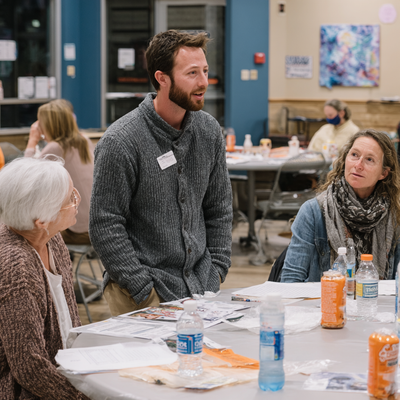Tom's yelling at kids again during craft time and I'm just sitting here pretending it's not happening.
Like seriously what is wrong with me? Emma spills glue and he goes "Emma come on be more careful!" in this really sharp voice and she just starts crying right there.
Other kids freeze up like oh crap Tom's mad. Parents looking at me like are you gonna do something about this?
And I'm standing there thinking I should probably say something but what if Tom gets offended? What if he quits? What if he thinks I'm micromanaging him?
So I do absolutely nothing. Again. Because apparently I'm five years old.
Then Emma's mom comes up after and she's like "Is Tom okay? Emma was really upset about getting yelled at." And I'm thinking great now I look like incompetent leader who lets volunteers terrorize children.
This is so stupid. Tom probably doesn't even realize he's doing it.
The Conversation I Finally Had
Okay so I corner Tom after service and I'm literally sweating because I hate confrontation so much.
"Hey Tom um can we talk for a sec? You seemed kinda stressed during crafts today."
And he's like "Oh yeah work's been really rough lately. Why?"
So I tell him about Emma crying and his face just drops. "Oh my god I had no idea. I've been so on edge I guess it's bleeding over. Thanks for telling me."
That's it. Five minute conversation. Problem solved. Why did I wait three weeks to do this?
Stop Assuming People Are Jerks
I used to approach feedback like volunteers were being mean on purpose. Made everything feel like getting in trouble at school.
Now I start with assumption they're good people who maybe don't realize there's issue.
"Tom I know you care about these kids so much. Wanted to chat about something that might help you connect even better."
Instead of "You're being harsh with kids" which sounds like accusation.
Makes them feel like we're solving problem together instead of me criticizing them.
Tell Them What Actually Happened
Don't say useless stuff like "You need to be more patient." What does that even mean?
Tell them exactly what you saw.
"When Emma spilled glue you said 'be more careful' in sharp tone and raised your voice. She started crying and other kids went quiet."
Now they have something specific to work with instead of vague feeling they're screwing up.
Tom was like "I didn't realize my voice was that harsh. I was just trying to help her clean it up."
Timing Is Everything
Don't save feedback for weeks then dump it all at once. Address stuff right after it happens.
"Can we talk about what just happened with Marcus?"
But not in front of everyone. Pull them aside somewhere private.
Also don't do it when they're already stressed. Jessica was dealing with difficult parent so I waited till she calmed down.
Same feedback can be helpful or devastating depending when you give it.
Ask Questions Instead of Giving Orders
"How do you think that went with Marcus? What might work better next time?"
Let them figure out solutions instead of just telling them what to do.
Tom came up with way better ideas than I had. "Maybe I should take a breath and speak quieter when kids are struggling."
People follow through better on plans they think of themselves.
Mix Good Stuff with Problems
"Tom you're amazing at explaining things and kids really listen to you. If you could just soften your tone when they mess up they'd feel even more comfortable asking for help."
Shows what they're doing right while addressing what needs work.
Follow Up Later
"How did craft time feel last Sunday? Did that approach work better?"
Shows you care about their success not just correcting mistakes.
Tom loved that I remembered to check instead of just moving on.
When People Get Upset
Jessica almost cried when I said she seemed overwhelmed. "I'm trying my best here."
Had to stop and deal with emotions first. "I know you're trying your best. Not criticizing you as person. Just wondering if we can make things easier."
Once she calmed down we could actually problem solve.
Individual vs Group Issues
Some things need addressed with whole team. But personal stuff needs private conversation.
Don't bring up behavior issues in front of everyone. Made that mistake once and whole group felt criticized.
Forget the Sandwich Method
Don't sandwich criticism between compliments. "You're great but this sucks but you're still great."
People see through that. Just be real. Give genuine encouragement when you see good stuff. Give feedback when there's problem.
When Someone's Wrong Fit
Had volunteer who wasn't connecting with kids at all. Finally suggested she try greeting team instead.
"Kids ministry might not be your strength. You're so good with adults though."
She moved and loves it. Sometimes kindest feedback is helping someone find better role.
What Works
Being specific not vague. Addressing problems quickly. Asking questions not giving orders. Assuming good intentions. Following up. Mixing encouragement with feedback. Good timing.
What Doesn't
Avoiding conversations. Being vague. Dumping everything at once. Making it personal. Forgetting the good stuff. Public criticism.
Why It Matters
Volunteers want to do well but can't fix what they don't know about.
Good feedback helps people grow.
Early intervention prevents bigger problems.
Supported volunteers stick around longer.
Kids benefit when volunteers feel equipped.
Tom stopped yelling and kids love him now. Emma specifically asks for his table.
That's what good feedback does. Helps people become better instead of just making them feel bad.
Worth every uncomfortable conversation.
YouTube Video:
Podcast Episode:








